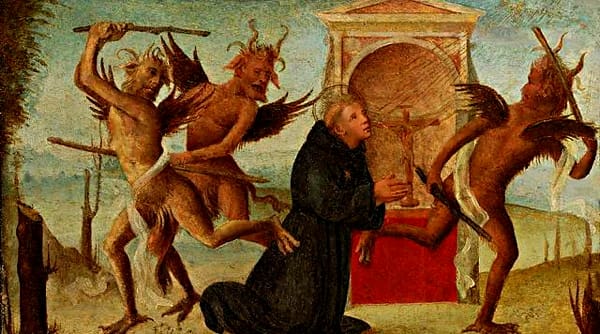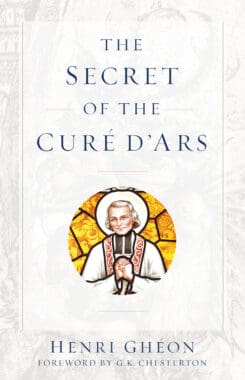No saint has escaped temptation. Three times was the Master of them all tempted by the evil one — in the desert, on the high mountain, on the pinnacle of the Temple. The devil was beaten then; but the devil never learns from his defeats. He keeps on in the hope that if nine hundred and ninety-nine saints are too much for him, there may yet, some day, be a thousandth.
Saints, he feels, are game worth hunting, just because they are so difficult to bring down. The souls of ordinary men, slaves of the flesh, not overmuch concerned as to their last end, are — not exactly not worth bagging — but at least poor sport, easily come by. A touch to the pride, a pleasing shape offered to the eye of lust, a jerk to cupidity — and a soul goes rolling down the slope. Into the crack caused in the nature common to all men by Original Sin and widened in each individual man by such sins as he chooses to commit on his own account, the devil simply slips his thumb from time to time to make sure that it remains open — and the habit of sin does the rest.
Even in the armor of a saint there are chinks. But prayer, penance, good works, and the grace of God combine to mend the rents and strengthen the weak places. It often requires nothing short of angelic skill to discover the exact spot — perhaps the only spot — where the knife point may be slipped through. But the evil spirit, “the prince of this world,” and his myriad satellites are, even in their fall, angels; and their fall has not changed their essence or the sort of knowledge proper to it. They wander around the world — with God’s permission — with intent to destroy us. Often enough, they do destroy us, though often, again, they give us opportunities to gain merit; but they try not to think of this.
For the greater part, they are hidden; they carry out their plans incognito. They know that man is very touchy about his liberty, and that when he refuses to bend before God’s grace, it is not simply that he may be enslaved to the commands of another master. They are careful not to alarm man or anger him. They disguise themselves as his inclinations, his faulty reasonings, his fancies; for a man is not likely to be distrustful of what he thinks issues from himself.
When they find a man striving along the way of perfection, they make use of his virtues rather than his vices; they urge him to resolutions too great to be kept; they get him to place too heavy a burden on his heroism — and then they wait for him to grow weary. They imitate the inspirations of the Holy Spirit and parody the good angels. When they manage to make a saint conscious of his sanctity, his sanctity is half conquered. But their most deadly weapon is the scruple that eats into a man’s resolution, sets it wavering, and even swings it bodily from its true end or paralyzes its striving.
When they have tried in vain all the hidden tricks they know, they tear off their mask — to be precise, they assume a body, or at any rate, a bodily appearance, to intimidate or terrorize, or it may be merely to harass their victim. And as they have a certain control of matter, they can produce sounds, gleams of light, mists, movements of every kind. Their power is limited only by the will of God.
All this is very far from that notion of evil in the abstract, which is such a comfort to so many good Christians. When our world sees some great happening in the spiritual order, do not dream that the devils remain unconcerned. God showed also that there is no limit to self-oblation and that His grace can make up what His chosen ones lack — not only in knowledge, wisdom, strength, and health, but even in sleep or food.
We shall never know here on earth in what measure God allowed the demon to tempt M. Vianney in the living depths of his soul. It would seem that man’s ancient enemy soon gave up the effort to conquer him on the side of human weakness; there was no success to be hoped for against such a degree of faith, abnegation, and love. The fiend tried perhaps to sow doubts of his vocation, of the rightness of his penances, of the value of his work. Certainly he had something to do with that temptation to flee which, as we shall see, assailed the curé more than once.
At any rate, we may assume that he met a good many defeats and disappointments; his own action proves it very thoroughly. After all, if he could have managed to upset the soul, he would scarcely have assailed the body with such childish obstinacy. Noises, blows — for a spirit, these are only a forlorn hope. The devil was dissatisfied with his results, and he showed it. He showed it to the Curé d’Ars from 1824 to 1858 — thirty-five years — the fool!
His idea presumably was to weary out the saint, to keep him from prayer; perhaps, quite simply, to keep him from sleep and so diminish the activity of the curé’s ministry — which was becoming a serious hindrance to the devil’s own operations — or even get him out of the place; in any case, to spite the curé and save his own face by a display of his power, for when you are searching for the devil’s motives, never overlook his pride.
But, you say, why did God let him? His wretched servant was already giving to souls twenty hours out of the twenty-four. He tried to close his eyes and could not. Must he give his sleep too?
God was more ambitious for His saint than we are. He wanted to place him, in the eternity of his glory, as near as possible to Himself, one of the stars of the first brilliance. That sort of thing has to be paid for, and even then you get it for nothing. God showed also that there is no limit to self-oblation and that His grace can make up what His chosen ones lack — not only in knowledge, wisdom, strength, and health, but even in sleep or food. It is worth our while to look at some of the demon’s “tricks.”
+
This article is adapted from the book The Secret of the Curé D’Ars by Henri Ghéon which is available from Sophia Institute Press.
Art for this post on the Devil vs. Saint John Vianney: Cover image used with permission; Partial restoration of The Temptation of Saint Nicholas of Tolentino, Tuscan School, early 16th century, PD-US author’s life plus 100 years or less, Wikimedia Commons.





